|
|
|
Sort Order |
|
|
|
Items / Page
|
|
|
|
|
|
|
| Srl | Item |
| 1 |
ID:
124983
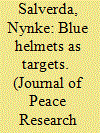

|
|
|
|
|
| Publication |
2013.
|
| Summary/Abstract |
A majority of UN peacekeeping operations deployed to civil wars face violent attacks by rebel groups. To date, the academic study of this type of violence has been very limited. This article is a first attempt to fill this gap. In particular, I aim to examine why rebel groups fight against peacekeepers in some cases, while not in others. I argue that since peacekeepers are mostly impartial but not neutral, they become an actor in a conflict and tend to protect the weaker side from total defeat. This implies that on the one hand, relatively weaker rebels will seek protection from the government by peacekeepers. On the other hand, relatively stronger rebels will challenge the peacekeepers in order to restrict their behavior and/or make them withdraw. If stronger rebels are successful in targeting the peacekeepers and the peacekeepers withdraw or alter their behavior, a victory for these rebel groups should become easier. Using novel data on violence against UN peacekeepers, I find that indeed, stronger rebel groups are more likely to fight against peacekeepers.
|
|
|
|
|
|
|
|
|
|
|
|
|
|
|
|
| 2 |
ID:
184193
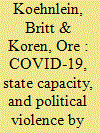

|
|
|
|
|
| Summary/Abstract |
The COVID-19 pandemic has constrained the ability of states across the world to govern and control their territories. As the state reduces its activities, space opens for violent non-state actors working for and against the state to fill the vacuum. Highlighting this trend, the present study evaluates the effects of COVID-19 and pandemics more broadly on attacks by non-state actors. Our theory emphasizes the incentives of both rebels and pro-government non-state actors (PGNs) to increase their attack frequency as disease spreads and the state retracts its governance activities to preserve resources needed elsewhere. In the first case, we highlight how the pandemic allows rebels to reduce asymmetries of power with respect to the military and establish themselves as a viable government alternative. In the second case, PGNs, which provide an alternative to militaries, are deployed to these contested spaces to thwart or pre-empt rebellion during the pandemic. Employing daily-level data on the annual change in armed conflict and COVID-19 cases across 127 countries between 1 January 2020 and 15 June 2020, we test both claims using an econometric identification strategy. We do not find clear evidence that COVID-19 led to a higher frequency of rebel attacks, suggesting that these groups prefer to bolster their standing using nonviolent means, or avoid fighting and preserve their resources. In contrast, we find that the frequency of PGN attacks has increased with COVID-19 prevalence compared with last year. Case studies of insurgent and PGN activity in Afghanistan and Nigeria lend additional support to these results, illustrating some underlying mechanisms. Our findings explore overlooked challenges that pandemics and other disasters pose to conflict mitigation and the role PGNs play in these contexts.
|
|
|
|
|
|
|
|
|
|
|
|
|
|
|
|
| 3 |
ID:
140349
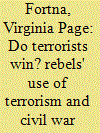

|
|
|
|
|
| Summary/Abstract |
How effective is terrorism? This question has generated lively scholarly debate and is of obvious importance to policy-makers. However, most existing studies of terrorism are not well equipped to answer this question because they lack an appropriate comparison. This article compares the outcomes of civil wars to assess whether rebel groups that use terrorism fare better than those who eschew this tactic. I evaluate the advantages and disadvantages of terrorism relative to other tactics used in civil war. Because terrorism is not a tactic employed at random, I first briefly explore empirically which groups use terrorism. Controlling for factors that may affect both the use of terrorism and war outcomes, I find that although civil wars involving terrorism last longer than other wars, terrorist rebel groups are generally less likely to achieve their larger political objectives than are nonterrorist groups. Terrorism may be less ineffective against democracies, but even in this context, terrorists do not win.
|
|
|
|
|
|
|
|
|
|
|
|
|
|
|
|
| 4 |
ID:
152408
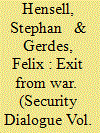

|
|
|
|
|
| Summary/Abstract |
The reintegration of rebels after war is a key security challenge. This article analyses the post-war transformation of rebels as a process of joining the established political elite. The political careers of former rebels vary. While some rise to senior political positions, others fail to consolidate their power. Taking theoretical notions of Pierre Bourdieu as its point of departure, this article outlines the central role of social capital in the post-war political field, which allows for an analysis and explanation of differences in rebel inclusion and exclusion. The article argues that the political careers of rebels are dependent on the accumulation of vertical and horizontal social capital in elite–mass and intra-elite networks. Case studies of Liberia and Kosovo demonstrate the plausibility of our thesis and the fruitfulness of a Bourdieusian approach in studying the political transformation of armed groups. This article contributes to the debate on the post-war reintegration of rebels as well as to the debate on practice approaches in international relations and security studies.
|
|
|
|
|
|
|
|
|
|
|
|
|
|
|
|
| 5 |
ID:
128574
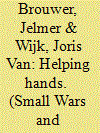

|
|
|
|
|
| Publication |
2013.
|
| Summary/Abstract |
This article analyses to what extent the Burmese KNU insurgency made use of external support from states, refugees, and diasporas. Based on extensive fieldwork it is concluded that support from neighbouring states and refugees has for years kept the Karen rebellion alive. Western countries perceived forms of resistance to the illegitimate Burmese regime as just and have therefore played a crucial role in the continuation of conflict in Karen State. It is important that policymakers and donors as well as executing organizations continue to reflect critically on the way they exercise their work.
|
|
|
|
|
|
|
|
|
|
|
|
|
|
|
|
| 6 |
ID:
192876
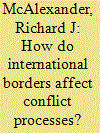

|
|
|
|
|
| Summary/Abstract |
Rebels can comply with international law during a conflict by not violating international borders, yet strategic goals may incentivize rebels to violate these borders. When do international borders affect the spatial and temporal distribution of rebel activity in a conflict setting? I theorize rebels have an incentive to refrain from violating borders when doing so will reduce their international legitimacy. When international legitimacy is a less important goal, rebels will be more likely to violate borders. I test this claim in the context of the 1948 War in Mandate Palestine by exploiting a quasi-natural experiment in how the 1947 UN partition line was drawn. Using an original dataset on over 1,000 Palestinian villages from British colonial documents and an atlas of aerial photographs of Palestine, I use a geographic regression discontinuity design to see how the UN partition line affected the location and timing of depopulated villages during the war. The results show that villages in areas that the UN assigned to the future Israeli state as part of the 1947 partition plan were more likely to be conquered before Israel received recognition. These findings have important implications for understanding where and when rebels target areas and shed new light on important dynamics of the 1948 War in Palestine.
|
|
|
|
|
|
|
|
|
|
|
|
|
|
|
|
| 7 |
ID:
182662
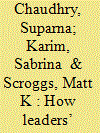

|
|
|
|
|
| Summary/Abstract |
The use of forced recruitment strategies during war can adversely affect military effectiveness and human rights. Given these costs, under what conditions do state leaders adopt coercive recruitment during civil wars? We find that between 1980 and 2009, states changed their recruitment practices 140 times during civil wars – half of which were towards coercive recruitment. Since structuralist explanations focus on factors that remain more or less constant over time, they cannot explain the frequency of these changes. Instead, we focus on individual-level factors and argue that leaders’ dispositions as risk-takers determine their beliefs about using force to solve collective action dilemmas during civil wars. Further, conflict context matters for leaders’ recruitment decisions – when rebel groups engage in coercive recruitment, leaders may also feel more justified in using such strategies. Using the LEAD Dataset and data on recruitment, we find that risk-tolerant leaders, including those who have had careers in the security sector, as well as those who have prior experience as a rebel or revolutionary leader, are more likely to use force to increase recruitment. While we theorize that this effect may be mitigated by combat experience, the evidence is mixed. Lastly, we find that rebels’ use of forced recruitment makes state leaders less likely to use voluntary recruitment.
|
|
|
|
|
|
|
|
|
|
|
|
|
|
|
|
| 8 |
ID:
127453
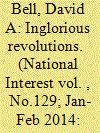

|
|
|
|
|
| Publication |
2014.
|
| Summary/Abstract |
TWO AND A HALF years after it began, the revolution was widely considered a quagmire, even a disaster. Rebels had made disappointingly little headway against the forces of the hated tyrant. The capital and the country's second major city remained under his control. Foreign powers had provided sympathy, but very little real aid. And despite promising to respect human rights, rebel forces were committing widespread abuses, including murder, torture and destruction of property. In short, the bright hopes of an earlier spring were fading fast.
|
|
|
|
|
|
|
|
|
|
|
|
|
|
|
|
| 9 |
ID:
133510
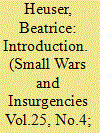

|
|
|
|
|
| Publication |
2014.
|
| Summary/Abstract |
When twentieth-century authors wrote about 'partisan warfare', they usually meant an insurgency or asymmetric military operations conducted against a superior force by small bands of ideologically driven irregular fighters. By contrast, originally (i.e. before the French Revolution) 'partisan' in French, English, and German referred only to the leader of a detachment of special forces (party, partie, Parthey, détachement) which the major European powers used to conduct special operations alongside their regular forces. Such special operations were the classic definition of 'small war' (petite guerre) in the late seventeenth and in the eighteenth centuries. The Spanish word 'la guerrilla', meaning nothing other than 'small war', only acquired an association with rebellion with the Spanish War of Independence against Napoleon. Even after this, however, armies throughout the world have continued to employ special forces. In the late nineteenth century, their operations have still been referred to as prosecuting 'la guerrilla' or 'small war', which existed side by side with, and was often mixed with, 'people's war' or popular uprisings against hated regimes.
|
|
|
|
|
|
|
|
|
|
|
|
|
|
|
|
| 10 |
ID:
153984
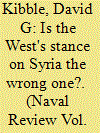

|
|
|
| 11 |
ID:
091000
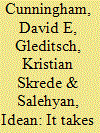

|
|
|
|
|
| Publication |
2009.
|
| Summary/Abstract |
Theories of conflict emphasize dyadic interaction, yet existing empirical studies of civil war focus largely on state attributes and pay little attention to nonstate antagonists. We recast civil war in a dyadic perspective, and consider how nonstate actor attributes and their relationship to the state influence conflict dynamics. We argue that strong rebels, who pose a military challenge to the government, are likely to lead to short wars and concessions. Conflicts where rebels seem weak can become prolonged if rebels can operate in the periphery so as to defy a government victory yet are not strong enough to extract concessions. Conflicts should be shorter when potential insurgents can rely on alternative political means to violence. We examine these hypotheses in a dyadic analysis of civil war duration and outcomes, using new data on nonstate actors and conflict attributes, finding support for many of our conjectures.
|
|
|
|
|
|
|
|
|
|
|
|
|
|
|
|
| 12 |
ID:
153615
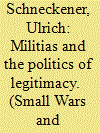

|
|
|
|
|
| Summary/Abstract |
Militias and rebels depart from different angles when it comes to the politics of legitimacy. While rebels have to address the issue of legitimacy early on in order to gain popular support, militias can rely on some kind of ‘borrowed legitimacy’. Based on this observation, the paper introduces militias as special form of organised violence visible in many civil wars and fragile states as well as elaborates on the politics of legitimacy typical for militias. By distinguishing different forms of militia violence (counter-insurgency, counter-rival and counter-crime), the articles shows how militias respond to major challenges in legitimizing violent actions.
|
|
|
|
|
|
|
|
|
|
|
|
|
|
|
|
| 13 |
ID:
075037
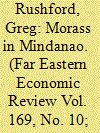

|
|
|
|
|
| Publication |
2006.
|
| Summary/Abstract |
Greg Rushford, editor of a free trade and security newsletter, finds that although a peace deal between the government and rebels is within reach in Mindanao, the prospects of pro-growth and reconciliation policies are slim.
|
|
|
|
|
|
|
|
|
|
|
|
|
|
|
|
| 14 |
ID:
097770
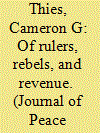

|
|
|
|
|
| Publication |
2010.
|
| Summary/Abstract |
This article investigates the relationship between civil war onset and state capacity through a focus on the role of primary commodities. This is accomplished by moving the focus of the civil war literature away from an almost exclusive concern with the incentives of rebels to a consideration of both rebels and rulers as revenue seeking predators. This predatory theory approach expects that higher levels of state capacity should deter civil war onset, while civil war onset should reduce state capacity. Further, natural resource rents are expected to enhance state capacity, rather than increase the likelihood of civil war onset. In order to deal with the endogeneity posed by including fiscal measures of state capacity in single equation models of civil war onset, this study employs a simultaneous equations framework. This framework allows us to capture the effects of civil war onset on state capacity and vice versa, as well as the effects of primary commodities on both endogenous covariates. The main findings from the statistical analyses include: state capacity does not affect civil war onset, but civil war onset reduces state capacity; and primary products directly affect only state capacity - they do not directly affect civil war onset, as found in previous contributions to the literature.
|
|
|
|
|
|
|
|
|
|
|
|
|
|
|
|
| 15 |
ID:
147048
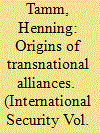

|
|
|
|
|
| Summary/Abstract |
Despite their catastrophic proportions, the Congo Wars have received little attention from international relations scholars. At the heart of these conflicts were alliances between rebel groups and neighboring rulers. What are the origins of such transnational alliances, which have been a major feature of nearly all civil wars in post–Cold War Africa? Recent scholarship on external support for rebel groups does not offer a clear answer, either providing long lists of the goals that state sponsors may have or avoiding the question of motives altogether. A focus on political survival reveals that African rulers form alliances with rebels in nearby states to reduce the threats of rebellions and military coups that the rulers themselves face at home. Transnational alliances serve either to weaken a ruler's domestic enemies by undermining their foreign sponsors or to ensure the continued allegiance of key domestic supporters by providing them with opportunities for enrichment. Case studies of the alliance decisions made in the two Congo Wars by the rulers of Angola, Rwanda, Sudan, Uganda, and Zimbabwe show that their struggles for political survival account for why they sided either with their Congolese counterparts or with Congolese rebels.
|
|
|
|
|
|
|
|
|
|
|
|
|
|
|
|
| 16 |
ID:
092308
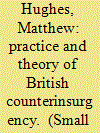

|
|
|
|
|
| Publication |
2009.
|
| Summary/Abstract |
This article details two largely unreported atrocities by British forces operating against Arab rebels during the Arab revolt, 1936-9, at the Palestinian villages of al-Bassa and Halhul. It then examines the military-legal system that underpinned and authorised British military forces operating in aid of the civil power, suggesting that the law in place at the time allowed for a level of reprisals and punitive actions, such as happened at al-Bassa and Halhul. The article does not conclude that the law allowed for atrocities but it does argue that it gave a basic form and understanding to an operational method that was brutal and could lead to atrocities. It thus tests the idea in much of the literature on counterinsurgency that the British were restrained and used minimum force when compared to other colonial and neo-colonial powers fighting insurgents.
|
|
|
|
|
|
|
|
|
|
|
|
|
|
|
|
| 17 |
ID:
091069


|
|
|
|
|
| Publication |
2009.
|
| Summary/Abstract |
In this article we propose a new typology for insurgent groups to explain why in such remarkably similar conflicts-Sri Lanka and Aceh-the impact of the 2004 Indian Ocean Tsunami was so different. We argue that two principal factors shape all rebel groups by defining their incentive structures: the efficiency of the return on investment of the primary source(s) of support and the group's territorial objectives. The former factor is especially strong in explaining the different choices made by the LTTE and GAM. In Sri Lanka, the availability of lucrative resources outside the country has made the LTTE leadership inimical to compromise, threatened by relief aid, and less reliant on the local population. Lacking access to such high-return funding sources, GAM on the other hand was more closely linked to the needs of the local population and found greater value in both outside aid and a comprehensive settlement.
|
|
|
|
|
|
|
|
|
|
|
|
|
|
|
|
| 18 |
ID:
135230
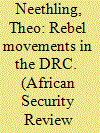

|
|
|
|
|
| Summary/Abstract |
Despite a generally valiant effort on the part of the United Nations (UN) since 1999 to bring peace and stability to the Democratic Republic of the Congo (DRC), the country continues to be destabilised by rebel forces. These armed movements pose a constant threat to the fragile transition in the DRC, and security in the country is continuously undermined. This article examines rebel forces in the DRC from two perspectives. Firstly, it examines such movements as a manifestation of sub-national terrorism. Secondly, it examines armed movements from the perspective of so-called ‘ungoverned spaces’. The view taken in this article supports the scholarly insight and argument that in countries such as the DRC, armed movements and militias are filling power vacuums that are the result of the inability and lack of military capacity of weak states to fight these movements effectively. Specifically, the eastern and north-eastern parts of the DRC have been major conflict zones where sub-national terrorists employ terror as a strategy. In this context, the DRC is severely affected by terrorism – a phenomenon in the DRC that is intimately linked to the failure to effect sustained development and to consolidate accountable and effective governance.
|
|
|
|
|
|
|
|
|
|
|
|
|
|
|
|
| 19 |
ID:
153609
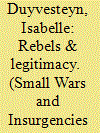

|
|
|
|
|
| Summary/Abstract |
This introduction to the double special issue on the theme of rebels and legitimacy aims to set out the parameters for the discussion. It looks at legitimacy as a concept and at legitimation as a process. To date most of the literature on legitimacy has focused on the state. However, rebel groups such as insurgents, terrorists, warlords and guerrillas have all had claims, and continue to claim, legitimacy as well. How and when are these rebels seen as legitimate actors? Existing suggestions of rebel legitimacy focus heavily on state models of social order and the social contract. This first contribution discusses how to conceptualize legitimacy and how to make it operational. A two-pronged approach, borrowing heavily from Max Weber, is proposed. Legitimacy is investigated based on beliefs and belief systems about what is considered legitimate. This is combined with practices whereby legitimacy is enacted, copied and emulated by the population the rebels claim to represent.
|
|
|
|
|
|
|
|
|
|
|
|
|
|
|
|
| 20 |
ID:
139696
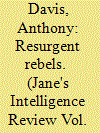

|
|
|
|
|
|
|
|